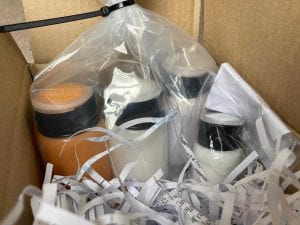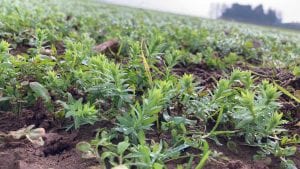
24 Mar A Year in the Life Series: Winter
A Year in the Life of…. Winter
24 March 2021
Over this coming year, Cefetra are giving you an insight into what goes on behind the scenes on arable farms and the immense amount of work that goes into producing a wide range of annual crops.
In the spotlight this month is Hannah who is an Agronomist for Premium Crops – a division at Cefetra.
Bio About myself:
Hannah Foxal l, Agronomist for Premium Crops and walk crops across the UK. I have specialised in minor combinable crops for nearly four years now. I manage a team of Agronomists and enjoy the variety of crops and people I meet.
l, Agronomist for Premium Crops and walk crops across the UK. I have specialised in minor combinable crops for nearly four years now. I manage a team of Agronomists and enjoy the variety of crops and people I meet.
I took a BSc in Agriculture at the University of Nottingham and then later a masters at Warwick University in Sustainable Crop Production. I am not from a farming background, but the degree fed my interest in plants and especially in Agronomy.
I cover a variety of jobs from managing a team of agronomists, gaining pesticides Extension of Authorisation for Minor Use EAMUs, designing agronomy trials and projects to improve the understanding and chemistry available for minor crops, visits farms, provide technical support to growers and agronomists, linseed seed crop inspector and write bespoke technical bulletins.
The winter months are generally when crop agronomy goes quiet and the wait begins in hope that the weather is favourable for spring jobs. January to February is generally used to plan for the Spring, currently, we are planning several spring trials on top of the winter ones in the ground. These include plot herbicide screenings, glasshouse herbicide screen and fertiliser trials. It should be remembered for minor crops there is no industry-led research into agronomy or on-label pesticides, and therefore Premium Crops have to carry out most of the ground-breaking work. On top of the agronomy trial are variety trials, the agronomy for which I am responsible. The varieties are screened from the south of England and into Scotland to test winter hardiness and get a good indication of variety characteristics over various soil types and weather co
nditions.
The spring technical bulletins will be written and checked and any technical concerns from growers/agronomists answered. I attend shows, with Cereals 2021 hopefully going ahead this year and write the Monitor Farm and News from the Field pages for the Premium Crops website. The monitor farmers are around the country and provide a sort of blog of what their crops look like and how they manage them. The News from the Field page aims to help educate everyone, about such items as unusual pest or disease damage symptoms to help others if they have the same problems.


The main challenge I face is pesticide authorisations. It is my job to monitor the minor crop EAMUs, specifically their expiry dates and make sure new applications are made to allow growers the armoury they need to grow the crops. The loss of Reglone was a big loss to Linseed and meant our seed crops were without a desiccant for Harvest 2020. The AHDB Horticulture team were excellent in helping us gain an Emergency Approval for Spotlight Plus for seed crops last season. The next loss will be the herbicide Bromoxynil, which is set to expire September 2021. Filling this herbicide gap will be a huge challenge.

To give some context for minor crops there are few on-label pesticides authorisations. This means we have to extrapolate from main crops for an Extension of Authorisation for Minor Use (EAMU). EAMUs require the same residue studies as main crops do, which we do not have the resources to do. To save us from having to generate the residue data, most of our Linseed EAMUs are extrapolated from other oilseed crops, such as Oilseed rape. This further limits our list of potential pesticides, especially as cereal herbicides are safe in Linseed whereas not all rape herbicides are safe in Linseed. Hopefully, the herbicide screens will reveal some safe Oilseed herbicides for use in Linseed.

Another challenge has been the strain Covid has put on everything. Visits have not been as numerous as normal, and this means I cannot find or discuss issues with farmers in the field. Some crops have been impacted by the freezing winds of February which will add complications to spring input timings. The number and calibre of virtual field days and events has been exceptional and really given food for thought. I encourage any of Premium Crops growers who want some advice, no matter how small to pick up the phone and call us. It has been saddening to see how some farmers have been isolated more than ever during Covid, and it is important to stay in touch in times like these.
A massive thank you to Hannah for participating in Cefetra’s Year in a Life series, catch-up with us next month for our Spring feature. Are you farmer and interested in selling and marketing your grain? Get in touch with Cefetra today to find out how we can maximise opportunities for you.




Sorry, the comment form is closed at this time.